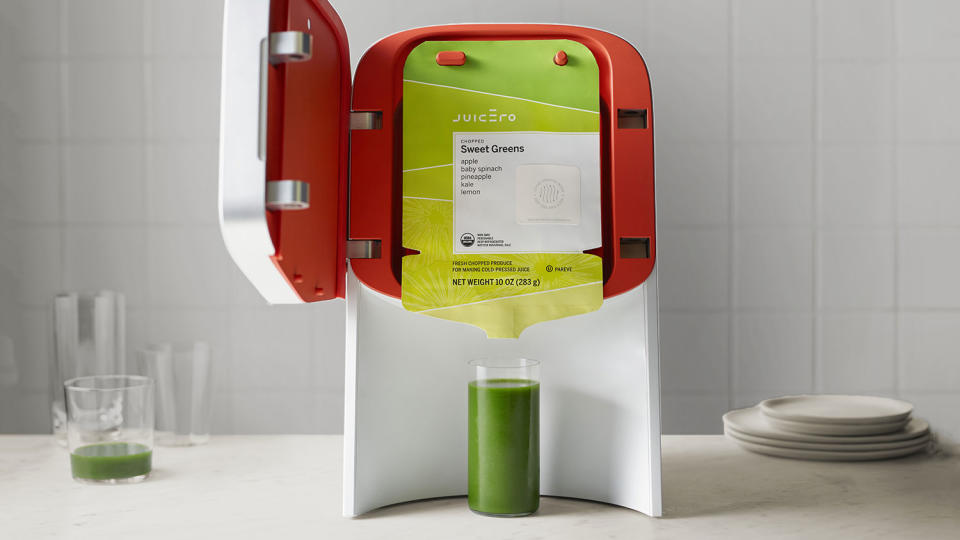The $400 Wi-Fi juicer perfectly illustrates the state of tech today
Twitter was treated to an extra special session of schadenfreude this week in the form of a Bloomberg article that took some of the shine off the now-notorious $400 (formerly $700) wi-fi-enabled Juicero juicer. It found that the gadget, backed by $120 million in venture capital money, was not necessary to squeeze its juice packets. Squeezing the packets by hand, it turned out, was just as efficient as the device dreamt up by a founder who compares himself to Steve Jobs.
The Juicero saga is another example of taking Silicon Valley ideas to their logical ends, which often just amounts to adding wi-fi and Bluetooth to established technology. But after almost half a decade of heavy smartphone adoption, consumers appear to be getting tired of tech for tech’s sake.

Recently, the most egregious example of tech for tech’s sake was Apple’s discontinuing of the headphone jack on the iPhone 7 to promote wireless headphones; it was a move consumers have rejected if the sheer amount of USB headphone adapters and over 300,000 petition signatures are anything to show for it. People like the headphone jack and the technology is cheap and works well. As my colleague Rob Pegoraro noted last year, this is why people hate the tech industry.
One of the tech industry’s biggest challenges today is spotting a Juicero and canceling it before it gets usurped by a pair of hands. A product may have some wild tech, but if it’s an extra $100, needs to be charged every night, or doesn’t offer any visible benefit, there’s a good chance it won’t pass the consumer sniff test.
A key example is how consumers have largely rejected smart appliances. For many consumers, choosing a slightly cheaper fridge without an LCD screen on its front meant not having a fridge that looks like an iPhone 4S in a few years—outdated and probably broken. For others, the expense of unnecessary features was a deal breaker. And for high-end kitchens, the allure of a screen was no match for the camouflage of a built-in Sub Zero or a stainless steel Viking. For every Nest that lets users change the thermostat or put it on a schedule – and thus actually saves them money – there are many wi-fi toasters sitting unsold on shelves.
The problem isn’t the engineering, it’s the idea
Today’s tech challenges aren’t necessarily ones of engineering, but rather convincing consumers that it makes sense to Jetson-ize. Credit cards work well, and consumers by and large are not convinced that Apple, Android, and Samsung Pay mobile wallets are worth using. The Apple Watch sales have been a disappointment, though the second-generation’s fitness capabilities gave it a better argument. Finding a pair Snapchat Spectacles (SNAP) in the wild is harder than spotting a unicorn or Richard Simmons.
At the recent Facebook F8 (FB) conference, CEO Mark Zuckerberg unveiled Facebook’s augmented reality plans, creating a platform that would help usher in AR as the next big thing in technology. The potential promises of the tech in examples he cited—virtually annotating the real world, improving or changing how the real world looks, or creating virtual things in the real world—were illustrated by creating games, leaving notes for friends, and showing virtual street art.
Whether these use cases can prove useful or appealing for actual human people who aren’t related to Facebook employees is a big question. Some people may get a kick out of a digital acid trip, but the answer may very well be no—or at least, not on a regular basis.
But it could also mean not yet. There is a difference between something like Juicero and other technology that never quite succeeds in the form its creator intended, but provides valuable insight for other, future developments. This especially applies for something as open and broad as a platform, where there is little visibility beyond the limited uses proposed by the company. Think something like Google Glass, a project that was visually horrendous but concept-wise likely ahead of its time. The often-mocked glasses were more a proof-of-concept than an actual product ready for consumers, and the trail it blazed paved the way for Snapchat Spectacles, which may end up as yet another trailblazer that never won over the public, but paved the way for something that does.
While these “innovations” are fascinating to watch (what crazy gadget will they come out with next?) and flattering (it’s all for us, the consumers), much of the real groundbreaking is being done on a much less shiny level, like making internet faster and cheaper by companies like Google (GOOG) and Facebook. A robust, fast, and affordable network is a prerequisite to a crazy pair of glasses that lets you see the world as it was in the 1960s, or whatever AR use case you desire.
Juicero is now offering refunds.
Ethan Wolff-Mann is a writer at Yahoo Finance focusing on consumer issues, tech, and personal finance. Follow him on Twitter @ewolffmann. Got a tip? Send it to tips@yahoo-inc.com.
Read more:
Uber’s new tipping dilemma: low prices or smooth experience
Zuckerberg at Facebook conference: if you take one thing away—this is it
The cost of unifying North and South Korea
The trick to getting credit card fees waived? Just ask
Chase’s Sapphire Reserve is very worth it, even with its slashed bonus

 Yahoo Finance
Yahoo Finance 